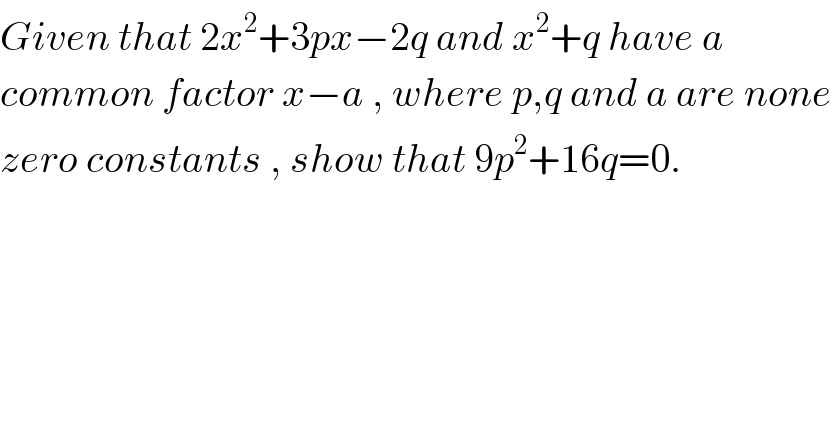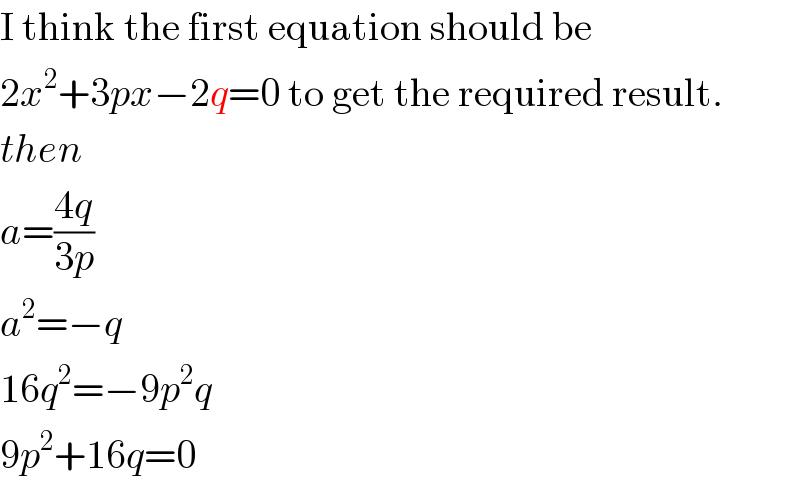
Question Number 4707 by 314159 last updated on 28/Feb/16

$${Given}\:{that}\:\mathrm{2}{x}^{\mathrm{2}} +\mathrm{3}{px}−\mathrm{2}{q}\:{and}\:{x}^{\mathrm{2}} +{q}\:{have}\:{a} \\ $$$${common}\:{factor}\:{x}−{a}\:,\:{where}\:{p},{q}\:{and}\:{a}\:{are}\:{none}\: \\ $$$${zero}\:{constants}\:,\:{show}\:{that}\:\mathrm{9}{p}^{\mathrm{2}} +\mathrm{16}{q}=\mathrm{0}. \\ $$
Commented by prakash jain last updated on 26/Feb/16

$$\mathrm{If}\:\mathrm{equation}\:{a}_{\mathrm{1}} {x}^{\mathrm{2}} +{b}_{\mathrm{1}} {x}+{c}_{\mathrm{1}} =\mathrm{0} \\ $$$$\mathrm{and}\:{a}_{\mathrm{2}} {x}^{\mathrm{2}} +{b}_{\mathrm{2}} {x}+{c}_{\mathrm{2}} =\mathrm{0}\:\mathrm{have}\:\mathrm{one}\:\mathrm{common} \\ $$$$\mathrm{root}\:\alpha\:\mathrm{then} \\ $$$$\frac{\alpha^{\mathrm{2}} }{{b}_{\mathrm{1}} {c}_{\mathrm{2}} −{b}_{\mathrm{2}} {c}_{\mathrm{1}} }=\frac{\alpha}{{a}_{\mathrm{2}} {c}_{\mathrm{1}} −{a}_{\mathrm{1}} {c}_{\mathrm{2}} }=\frac{\mathrm{1}}{{a}_{\mathrm{1}} {b}_{\mathrm{2}} −{a}_{\mathrm{2}} {b}_{\mathrm{1}} } \\ $$$${for}\:{the}\:{given}\:{question}\:\alpha={a} \\ $$$${a}_{\mathrm{1}} =\mathrm{2},{b}_{\mathrm{1}} =\mathrm{3}{p},{c}_{\mathrm{1}} =−\mathrm{2}{p} \\ $$$${a}_{\mathrm{2}} =\mathrm{1},{b}_{\mathrm{2}} =\mathrm{0},{c}_{\mathrm{2}} ={q} \\ $$$${a}=\frac{−\mathrm{2}{p}−\mathrm{2}{q}}{−\mathrm{3}{p}}=\frac{\mathrm{2}\left({p}+{q}\right)}{\mathrm{3}{p}} \\ $$$${a}^{\mathrm{2}} =\frac{\mathrm{3}{pq}}{−\mathrm{3}{p}}=−{q} \\ $$
Commented by prakash jain last updated on 26/Feb/16

$$\mathrm{I}\:\mathrm{think}\:\mathrm{the}\:\mathrm{first}\:\mathrm{equation}\:\mathrm{should}\:\mathrm{be} \\ $$$$\mathrm{2}{x}^{\mathrm{2}} +\mathrm{3}{px}−\mathrm{2}{q}=\mathrm{0}\:\mathrm{to}\:\mathrm{get}\:\mathrm{the}\:\mathrm{required}\:\mathrm{result}. \\ $$$${then} \\ $$$${a}=\frac{\mathrm{4}{q}}{\mathrm{3}{p}} \\ $$$${a}^{\mathrm{2}} =−{q} \\ $$$$\mathrm{16}{q}^{\mathrm{2}} =−\mathrm{9}{p}^{\mathrm{2}} {q} \\ $$$$\mathrm{9}{p}^{\mathrm{2}} +\mathrm{16}{q}=\mathrm{0} \\ $$
